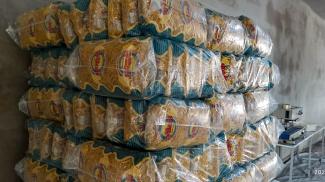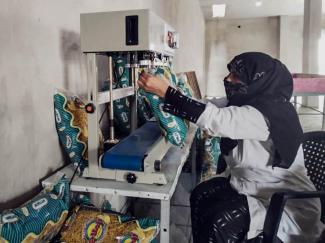In 2018, intense conflict at the peak of ISIS control displaced Ayman* and his family from their home in al-Mayadin, in Raqqa governorate. Even before violence ultimately drove them from their home, the family already lost their livelihood as their established factory was robbed of machinery and resources.
Determined to restart his life, Ayman resettled his family in a neighboring town in Raqqa governorate in 2021 and decided to open a vermicelli production business.
Vermicelli is a type of noodle primarily made of wheat that is often found in traditional Levantine rice dishes. Severe drought conditions in recent years adversely impacted wheat harvests in Syria and increased Syrians’ reliance on more expensive vermicelli imports to the region by nearly 80 percent. Not only were costs higher for imported vermicelli, global supply chain disruptions made it hard to find on local stores’ shelves.
Drawing from his previous experience as a business owner, Ayman saw the opportunity for growth and began to work alongside local farmers to cultivate locally-sourced wheat vital to produce vermicelli. Despite high initial interest in Ayman’s business, several challenges emerged. Ayman’s business struggled to maintain noodle quality and consistency, which led to high production costs and product waste.
To support his business, USAID worked with Ayman to standardize internal procedures at every step of the production process. USAID’s assistance introduced the importance of sample testing, production milestones, and final product checklists to improve Ayman’s business operations. USAID also helped Ayman invest in a new packaging and weighing machine, which allowed him to offer standardized packaging in three different sizes.
Following USAID’s support, Ayman’s company increased production from two and a half tons to nearly six tons of vermicelli per week. Ayman was also able to reduce product waste from 5 percent to 3 percent per batch and earned extra profit by selling the waste to farmers as livestock feed. Ultimately, Ayman’s success allowed him to increase his workforce fivefold, from three to 15 employees, most of which are women. With USAID’s help, Ayman’s vermicelli business is reaching new markets and making him a leading producer in the region.
“I searched for a job to meet my living needs and to help my husband bear the burdens of life as we have young children,” said newly hired Amina**. “I was overjoyed when I was hired and now work in the packaging department. I was able to learn quickly because of the clear work procedures put in place.”
USAID is supporting 70 local businesses like Ayman’s to improve business operations, attract private sector investment, and create an enabling environment for economic growth. This is often centered around developing new and/or improved management processes within businesses that remove constraints to scalability and long-term growth. These efforts are vital ingredients for stability, job growth, and reducing dependency on foreign assistance in non-regime-held areas of northeast Syria.
*Name changed to protect identity.
**Name changed to protect identity.

Pragma Corporation

Pragma Corporation

Pragma Corporation
